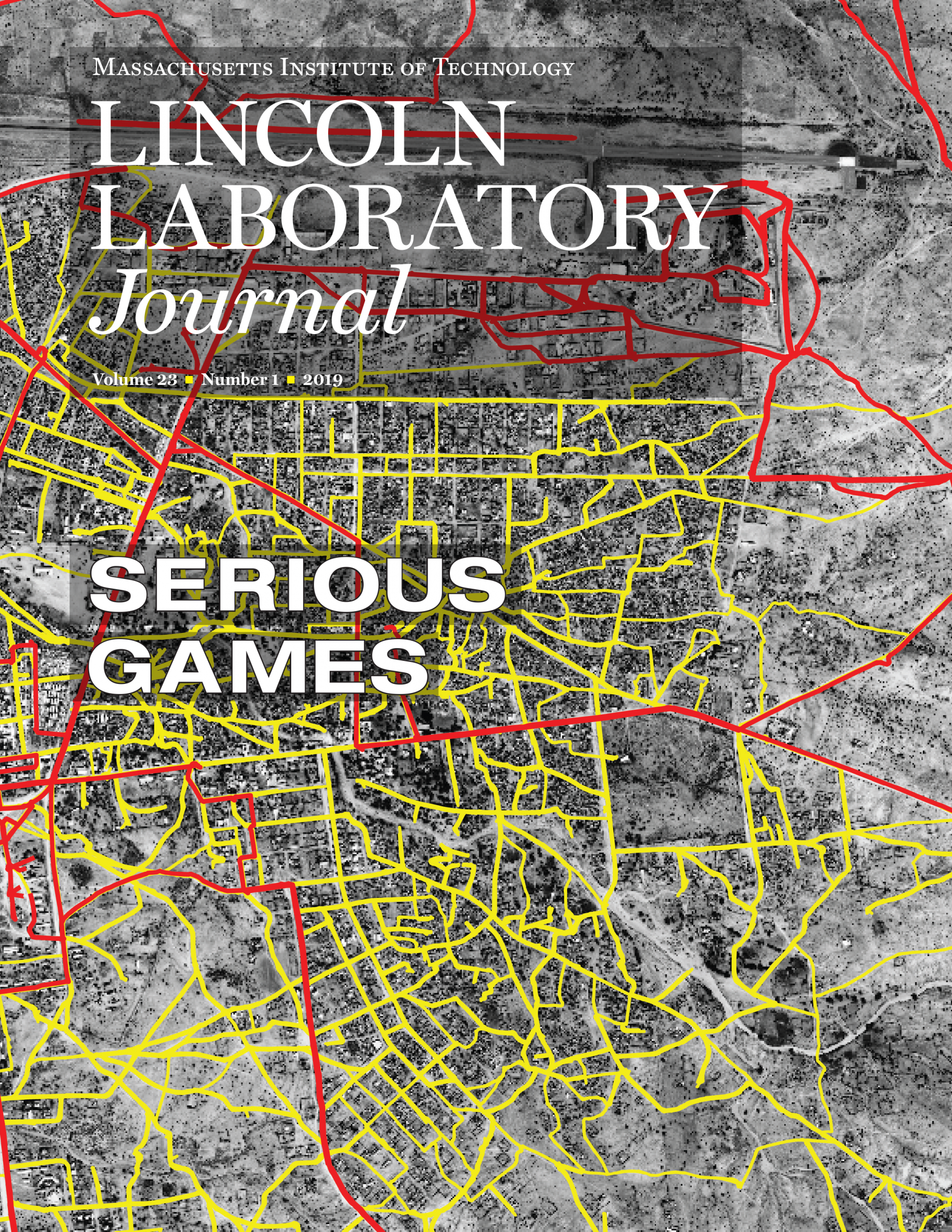Lincoln Laboratory Journal - Volume 23, Number 1

Game-Based Human-System Analysis for National Security R&D
Matthew P. Daggett, Timothy J. Dasey, Adam S. Norige, and Robert M. Seater
Serious games are influencing efforts to improve education, health care, defense, and awareness of societal issues by applying gamification to help users develop understanding and skills in these fields and to elicit knowledge from expert users. Researchers at Lincoln Laboratory are transforming traditional research and development processes by using games to design, engineer, and assess more efficient and effective sociotechnical systems for national security needs.
The Role of Serious Games in Ballistic Missile Defense
Brian M. Lewis and John A. Tabaczynski
Serious games have played an important role in the development of ballistic missile defense technology since the mid-1960s. At that time, Lincoln Laboratory initiated a series of games in which researchers assumed the roles of ballistic missile defense (BMD) system operators charged with mitigating a missile attack. Postgame analyses of gameplay led to increased understanding of the technology required to effectively identify and engage missile threats. Throughout the 1970s and 1990s, the BMD community concentrated on developing needed technology, and game playing fell into disuse. With the technology advancements of the 2000s, gameplay re-emerged as an effective way of determining how to exploit the new capabilities against an increasingly sophisticated adversary, and the Laboratory designed games that took advantage of new decision support tools.
Strike Group Defender
G. Mark Jones, Matthew C. Gombolay, Reed E. Jensen, and Steven L. Nelson
Defending U.S. Navy ships from the growing danger presented by modern anti-ship cruise missiles is a formidable challenge. Lincoln Laboratory, partnering with government and industry, developed the game-based trainer Strike Group Defender to equip the modern sailor with the knowledge and skills necessary to address the evolving threat. The combination of the immersive interface with novel machine learning and artificial intelligence techniques is advancing the state of the art in interactive training.
Cyber Red/Blue and Gamified Military Cyberspace Operations
Nancy L. Crabtree and Joshua A. Orr
Lincoln Laboratory researchers designed a serious game to investigate how such games could aid cyber security specialists in developing and practicing cyber defense strategies. Proof-of-concept experiments conducted with the prototype Cyber Red/Blue game yielded insights into game design and player behavior. An improved understanding of game dynamics can inform games' future development as tools for cyber security research, training, and real-world mission applications.
NASPlay: A Serious Game for Air Traffic Control
Hayley J. Reynolds, Brian C. Soulliard, and Richard A. DeLaura
A serious game developed for training air traffic managers and for exploring new procedures in air traffic management enables participants to gain broad experience with traffic management decision making and the repercussions of the decisions. The game gives operators the opportunity to tackle in a day or two the decisions that they would normally encounter throughout a whole year or more.
Rapid-Play Serious Games for Technology Triage
Robert M. Seater
Rapid-play serious games can allow players to gain intuition about the use of a proposed capability, enable researchers to examine that capability's influence on tactics and procedures, and collect quantitative data that supplement qualitative user feedback to inform decisions about which new technologies should be pursued with future development.
Serious Games for Collaborative Dark Network Discovery
Matthew P. Daggett, Daniel J. Hannon, Michael B. Hurley, and John O. Nwagbaraocha
Illicit social networks, such as trafficking or terrorist organizations, are difficult to discover because their clandestine nature limits their observability to data collection. Technological advances in remote sensing and analytical software can reduce the time- and humanintensive nature of network data curation and analysis, if effective human-system integration is achieved. To better understand this integration, researchers at Lincoln Laboratory created a succession of serious games to investigate methodologies for developing user-centered tools and quantitative humansystem instrumentation, with the goal of improving network discovery. These games were employed in a multiyear study of team analytical performance and collaborative decision making, encompassing more than 80 teams and upwards of 400 unique players.
Lab Notes
- A Serious Game for Intelligence, Surveillance, and Reconnaissance › A simulation experiment provides hands-on experience analyzing sensor data to discover mobile targets.
Looking Back
-
Early Gaming at Lincoln Laboratory: The Missile Defense Engagement Exercises of 1966 to 1968 › Researchers worked through the operational logic of a complex defense system in the early years of U.S. missile defense research.